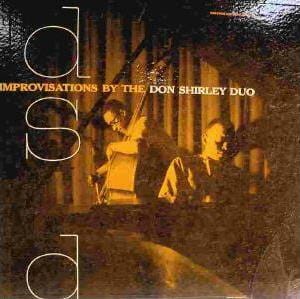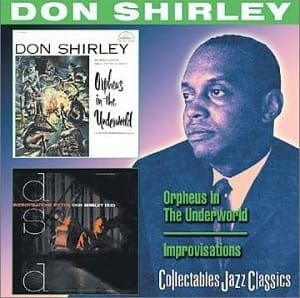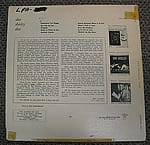 |
1. Sometimes I'm Happy - Don Shirley, Youmans, Vincent
2. But Not for Me - Don Shirley, Gershwin, Ira
3. Tenderly - Don Shirley, Gross, Walter
4. What Is There to Say? - Don Shirley, Harburg, E.Y.
5. Autumn Leaves - Don Shirley, Kosma, Joseph
6. Atonal Ostinato Blues in B
7. When I Fall in Love - Don Shirley, Young, Victor
8. Over the Rainbow - Don Shirley, Arlen, Harold
9. Let's Fall in Love - Don Shirley, Arlen, Harold
10. Walkin' by the River - Don Shirley, Carlisle, Una MaeReissued on
Collectable Jazz Classics
COL2756

Photo by Bob Kornheiser
This recording was made by use
of the famous Austrian "A.K.G." Microphone. Frequency
Response -- Flat from 30-20,000 cycles Playback--RIAA Curve |
|
 Of all the art forms, its is doubtful that any has
had a comparable evolution to jazz. In painting, the
formal and formalized great maters came first and
the emotionalists and realists later. In classical
music, the early giants wrote with what amounted to
mathematical science and not until later did
"longhair" music go experimental and whacky. Jazz
started the other way--a bunch of guys blowing the
best they could. Instead of getting wilder and more
uninhibited, jazz is steadily getting more
thoughtful and mental. Of all the newer jazz stars,
none is a better example of this than Don Shirley on
this new album. Of all the art forms, its is doubtful that any has
had a comparable evolution to jazz. In painting, the
formal and formalized great maters came first and
the emotionalists and realists later. In classical
music, the early giants wrote with what amounted to
mathematical science and not until later did
"longhair" music go experimental and whacky. Jazz
started the other way--a bunch of guys blowing the
best they could. Instead of getting wilder and more
uninhibited, jazz is steadily getting more
thoughtful and mental. Of all the newer jazz stars,
none is a better example of this than Don Shirley on
this new album.
The writer knows little about Shirley's background
indeed, his recorded background seems to conflict
with itself-but he is obviously an educated musician
who could be at home in the classics just as easily.
Indeed, were it not for his inventiveness and, at
times, his purely tricky imagination, much of his
work might be considered modern classical as well as
modern jazz. But he remains in the jazz fold
because, under all, he is a truly original talent
finely disciplined.
None of the "wild" jazzmen will take more chances
with a song. Listen, on this record, to his opening
for the familiar and, often in the hands of others,
the banal "Sometimes I'm happy." It's a while before
you know what he's doing or even what he's sashaying
up to. But then, with confidence and taste, he
begins to sort of shove the solid melody in under
the lace of his improvisations.
His refusal to use more than a bass viol for rhythm
has been debated by experts but for Shirley's piano
work he is probably correct. The bass player,
Richard Davis, gets highly amusing sometimes with a
sort of modified Slam Stewart trick. When he needs
full tones or even firm ones, Shirley knows it
instinctively and he can bear down promptly and hard
with both hands.
Personally, I thought that on this record Shirley
for the first time shows a little Erroll Garner
influence. This, be it hastily added, is not meant
as criticism. There is scarcely a pianist today who
couldn't adopt something of Garner's unique tones
and changes. All music is always based on some other
music of somebody's.
Only once on this record did Shirley disappoint me.
To my ear, his "Autumn Leaves" is done in too slow a
tempo with too much attention on style and not
enough on melody. But this miss, if it is one, is
more than outbalanced by Shirley's sensitive
interpretation of "What is There to Say" in which,
he almost seems to "pull the lyric" out of the song
and make it a part of his piano. Also, he is to be
congratulated for proving that somebody can come
along and play "Over the Rainbow' differently than
it's been drummed into our ears for years.
Of the newer jazz musicians who think, read and
count while still hanging onto the old feel of jazz,
Don Shirley is way up there in the top register.
Bob Sylvester
N. Y. Daily News
|

